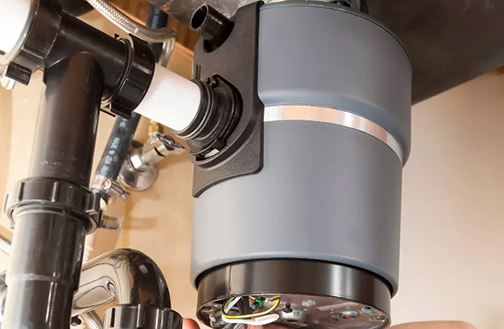Understanding Garbage Disposal Installation and Repair Services
Garbage disposals provide convenient kitchen waste management, but malfunctions disrupt daily routines and create frustrating cleanup situations. Professional plumbers handle complete garbage disposal installations and repairs, ensuring proper function and preventing common problems. Understanding when repairs suffice versus replacement needs and recognizing warning signs helps homeowners maintain efficient kitchen operations.
Common Garbage Disposal Problems Requiring Repair
Jammed or Stuck Disposals:
Jammed disposals represent the most frequent problem homeowners face. Hard objects, fibrous materials, or accumulated debris jam grinding mechanisms, preventing operation. Professional plumbers safely clear jams using specialized tools without damaging disposal components. Attempting DIY jam clearing risks injury and equipment damage—always disconnect power before troubleshooting disposal issues.
Leaking Units:
Leaks develop at sink flanges, discharge connections, or dishwasher attachment points. Worn gaskets, loose connections, or cracked housing cause water damage to cabinets and flooring beneath sinks. Professional assessment identifies leak sources and determines whether repairs or replacement make better sense based on unit age and damage extent.
Motor Problems and Electrical Issues:
Humming sounds without blade rotation indicate motor problems or electrical failures. Tripped reset buttons, blown breakers, or worn motors prevent normal operation. Professional electricians and plumbers diagnose electrical issues, determine whether motors can be repaired, and advise when replacement provides better value than motor repairs on older units.
Warning Signs Your Disposal Needs Professional Attention
Red Flags Requiring Expert Service:
- Persistent foul odors despite cleaning efforts
- Unusual grinding, rattling, or metal-on-metal sounds
- Water draining slowly or backing up into sink
- Disposal requiring frequent resets
- Visible rust or corrosion on unit exterior
- Water leaking from disposal housing
- Complete failure to turn on despite power connection
- Disposal age exceeding 10-12 years with multiple issues
These symptoms indicate problems beyond simple jams or clogs. Professional evaluation determines whether repairs restore function or replacement makes better economic sense.
Professional Garbage Disposal Installation
Proper Sizing and Selection:
Professional plumbers help select appropriate disposal sizes matching household needs. Smaller households function well with 1/3 to 1/2 horsepower units, while larger families benefit from 3/4 to 1 horsepower models handling greater waste volumes. Higher horsepower units grind more efficiently and handle tougher materials better.
Complete Installation Process:
Professional installation includes removing old units, updating plumbing connections as needed, mounting new disposals securely, connecting electrical components safely, and testing thoroughly. Proper installation prevents leaks, ensures adequate support, and verifies correct operation before completing the job. Licensed plumbers handle electrical connections meeting local codes and safety requirements.
Dishwasher Integration:
Many garbage disposals connect to dishwashers for drainage. Professional installation ensures proper knockout plug removal, secure hose connections, and adequate venting preventing backups. Improper dishwasher connections cause drainage problems affecting both appliances.
Repair Versus Replacement Decision Factors
When Repair Makes Sense:
Newer disposals under five years old with isolated problems typically warrant repair. Simple issues like reset button trips, loose connections, or minor clogs represent straightforward fixes. If repair costs remain minimal and the unit otherwise functions well, professional repairs extend disposal life economically.
When Replacement Provides Better Value:
Disposals over 10 years old experiencing motor problems, housing cracks, or repeated failures should be replaced. If repair costs approach 50% of new disposal installation, replacement offers better long-term value. Modern disposals provide improved grinding efficiency, quieter operation, and enhanced reliability compared to older models.
Preventing Common Garbage Disposal Problems
Foods to Avoid:
Never put fibrous vegetables like celery, corn husks, or artichokes down disposals—fibers wrap around blades causing jams. Avoid potato peels, pasta, rice, and expandable foods that swell and clog drains. Grease, oil, and fats solidify in pipes causing severe clogs. Coffee grounds accumulate creating stubborn blockages. Eggshells and bones damage grinding mechanisms despite common myths suggesting otherwise.
Proper Operating Techniques:
Always run cold water before, during, and 15 seconds after disposal use. Cold water solidifies any grease present, allowing it to grind rather than accumulate in pipes. Feed waste gradually rather than overloading disposals. Run disposals regularly even without waste to prevent rust and keep components moving freely.
Maintenance Practices:
Clean disposals monthly using ice cubes and rock salt to scrub grinding components. Citrus peels freshen units naturally without harsh chemicals. Avoid chemical drain cleaners—they damage disposal components and pipes. Professional maintenance every few years ensures optimal performance and identifies developing problems before failures occur.
Emergency Disposal Problems
When disposals completely fail, leak extensively, or create sewage backup situations, contact emergency plumbing services immediately. Continuing to use malfunctioning disposals worsens problems and risks water damage to kitchen cabinets and flooring. Never place hands inside disposals even when powered off—use tongs or pliers to remove visible objects safely.
Upgrading to Modern Disposal Technology
Modern garbage disposals offer significant improvements over older models. Sound insulation reduces operational noise dramatically—important for open kitchen layouts. Stainless steel grinding components resist corrosion better than older materials. Auto-reverse functions clear jams automatically. Continuous feed designs accommodate ongoing waste addition during operation while batch feed models offer enhanced safety through manual activation.
Professional Installation Benefits
Professional plumbers ensure disposal installations meet local plumbing and electrical codes. They verify adequate electrical circuits, proper grounding, and correct switch wiring preventing safety hazards. Professional work includes warranties protecting against installation defects and ensuring accountability. Licensed plumbers carry insurance protecting homeowners from liability if problems occur during installation.
Bottom Line: Expert Disposal Service
Professional plumbers provide complete garbage disposal installation and repair services ensuring reliable kitchen waste management. Whether addressing jams, leaks, or motor problems, expert diagnosis determines optimal solutions. Professional installation guarantees proper function, code compliance, and long-term reliability while repairs restore operation when economically sensible.
Next Steps for Disposal Issues
Your Garbage Disposal Action Plan:
- Disconnect power immediately when problems occur
- Never place hands inside disposals
- Contact licensed plumbers for assessment
- Determine disposal age and repair history
- Discuss repair versus replacement options
- Follow proper usage guidelines preventing future problems
- Schedule professional installation for replacements
—Need reliable plumbing help?
Contact Suburban Plumbing Experts today at (708) 729-9249


